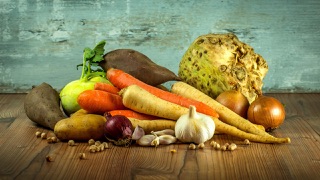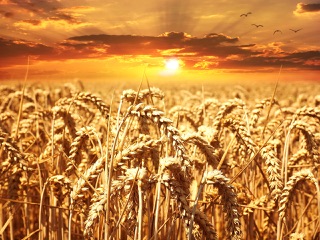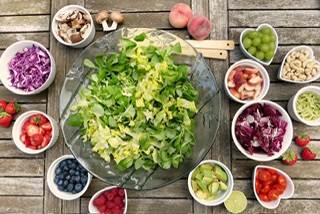It is typical during any type of spiritual awakening for diet to change radically. This is especially true of sudden or intense spiritual awakenings, such as kundalini awakening.
There are a few reasons why diet changes during spiritual awakening.
The major reason why diet changes during spiritual awakening is that the body can no longer handle foods that it once did.
We tend to have a rather carbohydrate and sugar laden diet, filled with heavy foods (or even non-foods, especially in America) that can be difficult to digest.
This shift is a result of the awakening of the body to the extent that it can clearly communicate– and we are conscious enough to listen– that what we are eating we are not digesting very well.
This has nothing to do with ideology, and everything to do with having increased awareness of how the food we eat impacts our system.
If we know how to listen to our body consciousness we can tell if our food is giving us energy, health, and wellness… or if it is making us feel sick.
During spiritual awakening the mind-body connection will be established to the extent that we naturally gravitate more towards foods that make us feel healthy, and lessen foods that make us feel unwell.

Food is the only addiction that we cannot stop entirely. We have such a complicated emotional relationship with food, and it is typical for food to emotionally offer us safe nurturing, a relief from boredom, and an escape from reality.
When we crave something sweet in life a piece of chocolate is always there; when we feel emptiness within on a soul-level filling ourselves with heavy foods temporarily alleviates that existential pain.
It is typical for most of us to be disembodied. When we are not present in our physical forms we will have difficulty knowing if we are hungry, when to eat and how much to eat because we are so distanced from any type of connection or clear communication with our bodies.
Add onto that the considerable stigmas that arise from body hatred: personal, societal, cultural, and advertising sources telling us that whatever shape we are, it is incorrect. On a spiritual level, this has everything to do with hatred of the physical form and a disconnection from the body (and by relation, the Earth).
During spiritual awakening the multiple layers of emotional and spiritual trauma regarding food come into our awareness to be resolved. By healing these layers, we find ourselves freer from the considerable burdens that have been placed upon us, as well as the rules regarding food that have been so heavily ingrained in our psyches.
I will in particular mention ancestral healing regarding food, as many of our ancestors suffered and died as a result of starvation, bad crops, war-time deprivation, and other food-related traumas. Many of us are understandably not aware of just how much ancestral traumas impact us in the here and now.

To delight in food, to have gratitude for it, rather than viewing it as the enemy or something that we have antipathy towards, can be considered an end goal of spiritual awakening.
When spiritual awakening, it is also typical for the senses to become sharper. For an apple to taste crisp and delightful, for us to experience the umami of a piece of chocolate. It is a mistake to believe that people awakening will stop eating (become “breatharians”, for example). It is much more correct to understand that as we become more embodied we come more into the present moment. When we are in the present moment we can appreciate our senses more.
Ultimately spiritual awakening lets us come into the present moment and to appreciate what is happening right in front of us. This then lets us fully acknowledge and take part in whatever we are eating. We will naturally find that food becomes less of a burden and more of something to consciously take part in– both to enjoy our sensate experiences as well as to nourish our spirit and physical form.
When we are more in our bodies we find that we have higher emotional intelligence (we can sit with our emotions rather than reach for the comfort of food, for example), and that our perfectionist control-based self-hating notions regarding our body can be released.

In the case of intense spiritual awakenings, such as kundalini awakenings, diet changes considerably because our energy is being utilized for transformative purposes.
Put more simply, if we are processing a lot of past emotions or traumas, if our body is going through considerable energetic shifts, and we are rapidly shifting our self-identity, that requires a lot of energy. The body then does not have the required energy to digest complex meals, or sometimes much food at all.
The body can go through such major shifts that food intake lessens or shifts. When the major energetic and spiritual shifts lessen, a more normal diet can be established. However, over time diet can permanently change. This may result in some cases eating less food, but more typical is to have enough of a mind-body-spirit connection that we eat more locally, in season, and what our individual body needs at that particular moment.
For dietary advice specific to kundalini awakenings, I would suggest my book Working with Kundalini.
For those engaged in significant mental, emotional, and spiritual shifts as a result of awakening know that there are plenty of helpful ideas out there, but that ultimately what your individual body needs will be individualized. There is no correct diet, no dogma to follow. There are helpful tips, but ultimately spiritual awakening leads to a release of belief systems and ideologies.
On a simpler level, people going through spiritual awakening often cling to helpful foods or a specific diet that may no longer be serving them. If we pay attention to the body consciousness and what it needs and wants, we will find that our diet will naturally shift over time, and any fear or rigid beliefs can release to allow for what is right for your system (to communicate with your body consciousness I suggest my book, The Body Deva).

The trickiest element to talk about in terms of dietary choices is shifts in ideology as a result of awakening. It is easy for the topic of diet to result in ego-driven, restrictive and separating ideologies. For example, “if she doesn’t eat the exact way I do then she isn’t awakening/enlightened/as conscious as I am”
As a result of becoming more conscious we may be become more interested in the environment or become more aware of how our individual choices affect the world. This is a natural result of “moving beyond the self”. In less conscious states, we are self-absorbed and unable to see outside of our own experiences of this world. When awakening, we come into states of oneness, becoming increasingly aware and more connected to those around us.
Spiritual awakening is a release of ideology, a release of this versus that (the self versus another). Ultimately, spiritual awakening releases the superiority-inferiority loop as well.
When we see another outside of ourselves that we hate or feel separated from (or superior/inferior to) that shows the unenlightened aspects of our own being.
This means that any ideology that we have, any lifestyle or dietary choices that we make– no matter how helpful or “right” they may be– are our own. If our ideologies are creating an us versus them dynamic, a belief in our own superiority and seeing others in a dehumanized or lessened way, that would be something to surrender… not something to cling to.
This also includes beliefs that we are special, different, or any other separation we create to keep the world, and the people in it, at bay. These beliefs are all defense mechanisms against reality and against connecting with others as a simple, ordinary, human being.
One of the most powerful self-inquiry questions that I have developed is: What if I were an ordinary human being, just like everyone else?
This cuts through considerable trauma, false ego, and other sources of disconnection that prevent us from becoming more conscious. Releasing anything that prevents us from being common, or even ordinary, being “just like everyone else” will ultimately result in freedom from the bondage of an ego that needs to feel self-important (different, chosen, etc) out of basic feelings of inferiority and worthlessness.

It is common for dietary and lifestyle choices to become things that feed the ego. You can tell when something is feeding the ego when it becomes something that separates, rather than connects. If anything is causing for us to feel separated (inferior, superior) to other humans, than we take that opportunity to look clearly at the source of that disconnection and heal it.
It is a matter of ego to believe that everyone else needs to ascribe to whatever our personal beliefs, dietary and lifestyle choices are. This is probably the least popular (and most derided) thing that I teach, as it is easy to cling to a sense of false superiority as a result of diet, and people are reticent to let go of anything that makes them feel superior to others.
We may not realize that our beliefs have emerged as a result of the influx of spiritual material, family, and culture. Eighty percent of the vegetarians in the world live in India. There are many other cultures and traditions out there that have different understandings regarding what makes us healthy or even “enlightened” when it comes to diet.
Ultimately any belief of our own superiority or feeling of moral rightness can be surrendered to become a more conscious individual.
The dogmas that emerge as a result of dietary choices may be the best choice for ourselves, for humanity, and for the environment. We can be an enlightened and knowledgeable resource for whatever dietary or nutritional path we choose.
We can also recognize that people come to awareness in different facets of their lives at different times, and choose to look within at any negative thoughts or separating beliefs that we have that keep us from seeing ourselves in each person that we meet.
When we can see each person that we meet as a part of ourselves– with kindness and understanding– we can know that the walls of separation that our egos have erected in an attempt to keep us safe have finally relented. When those walls come tumbling down, we become more conscious and connected to the world around us.
Mary Mueller Shutan is a spiritual teacher and author of several books, including The Body Deva, The Spiritual Awakening Guide, and Working with Kundalini

Thank you for the reply! We have been so misled when it comes to dietary choices, it can be quite a labyrinth to find one’s way out of. I resonate with your suggestion of embracing the dogma of certain healthy diets while customizing based on communication with our body.
Hi Mia-
Glad the blog struck a chord. Yeah, I could have written that a bit more clearly. What I am stating in that paragraph is that there is a lot of wonderful dietary and nutrition information out there, and that some diets out there can be really helpful (in a one size never fits all sort of way).
I do think that personally and collectively there are healthier and more ethical diets than others (but if you notice, I didn’t share what my personal dietary choices are, because that isn’t the point). We can learn about diet and its impact personally/collectively and have it positively impact ourselves and the people around us… without offering unsolicited advice, preaching, or looking down on others/dehumanizing them/making ourselves feel superior for having a different diet.
So basically some of the ideas out there regarding diet are amazing, but we can choose a diet for personal and collective benefit and by simply living out/embodying that diet we can be of benefit (and when we have any type of embodied wisdom, we will find that people will come to us as a resource naturally, especially if we are a compassionate resource, rather than one enacting the superiority/inferiority complex).
Hi Mary!
I am incredibly thankful for each blog post you write. I learn so much and I feel so uplifted by each and every one, truly. This one struck a chord several times over, and I’m actually reading the Body Deva now and learning to listen to my body more than ever.
There’s one short paragraph I didn’t understand, and I’m wondering if you’d be willing to unpack it a bit further:
“ The dogmas that emerge as a result of dietary choices may be the best choice for ourselves, for humanity, and for the environment. We can be an enlightened and knowledgeable resource for whatever dietary or nutritional path we choose.”
Thank you Mary for all the teachings you share via your blogs and books. Hope to have a healing with you soon.
Many thanks,
Mia